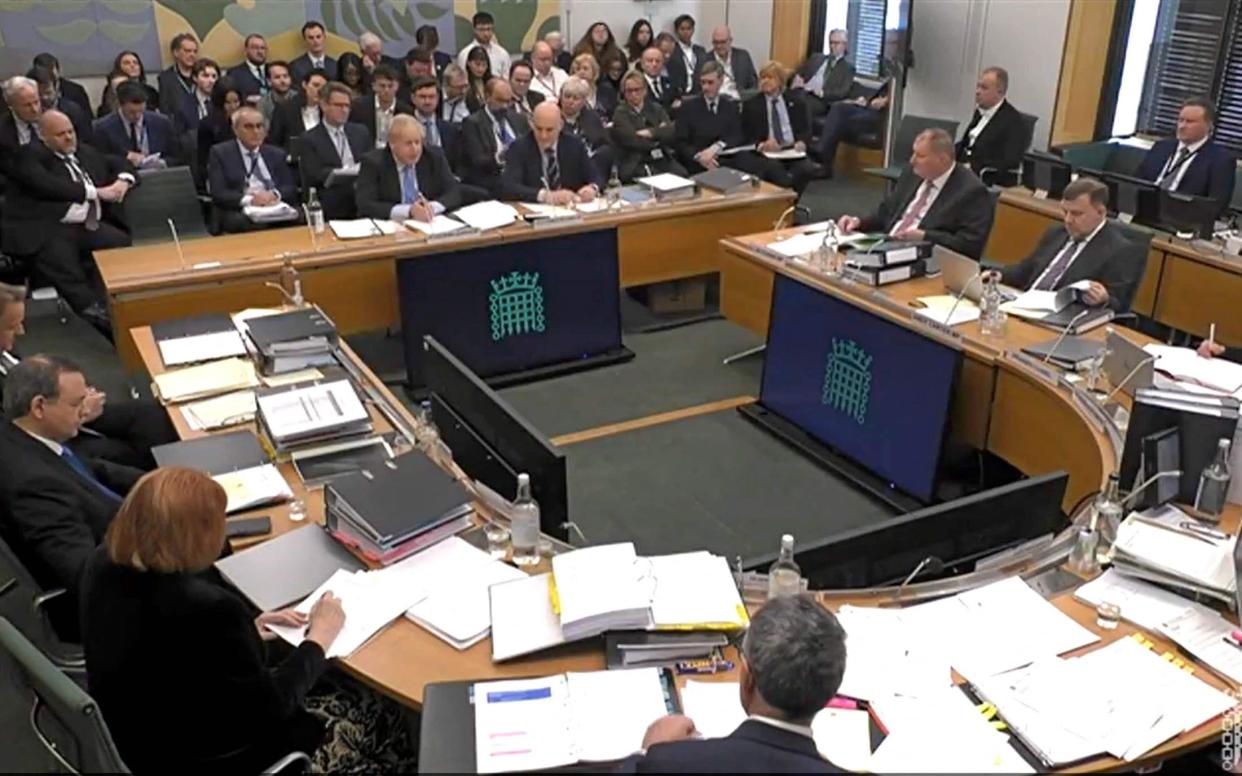President Nixon’s generation got Watergate. We got Boris Johnson and a third-rate party

Every generation gets the Watergate it deserves. Richard Nixon was accused of covering up a burglary; Boris, a third-rate party. But even if the charge seems small and tawdry, forcing Boris to account for it brought home how iniquitous the lockdown was - and how unusual his administration.
It was impervious to criticism, simultaneously authoritarian and cavalier. And before our very eyes, Boris briefly morphed into Donald Trump. I was half expecting him to lean into the mic and growl: "Wrrrrong."
His allies had suggested that the privileges committee is a kangaroo court: what did Boris think? “I have every confidence,” he replied, that you will show you can “be fair.” Does that mean he will accept the outcome, the MPs prodded? Well, given that it is as plain as day that he is innocent, it would be unfair if he were found guilty.
That is a classic populist move. Vaguely sinister. If an institution rules against you, challenge the reputation of the institution. Seed a conspiracy theory among your diehard fans.
For what it’s worth, Boris’s central argument was logical: what he told Parliament about the parties held in No10 might have been wrong but it wasn’t a lie, because he honestly thought it was true. The statements he made at the Despatch Box that “no rules or guidance were broken in No10” were issued in “good faith”, and there’s “nothing” to show he was “warned in advance” that gatherings might have been illegal.
The problem was that MPs - in a deliberately grey, pedantic manner (ten out of ten for Boris for not falling asleep) - went on to sift through countless pieces of evidence that prove that what he said was inaccurate and that he should’ve known it. In order to rebuff this, Boris laid out one of the most compelling arguments against lockdown I’ve heard, namely that its rules were practically impossible to follow.
No10 is a “cramped, narrow, 18th century townhouse,” he said. They did attempt social distancing. “We gave way to each other in the corridors" and, a fascinating detail here, “we didn’t touch each other’s pens.” But there was no “electrified forcefield around every human being”, so two metres wasn’t always possible to maintain.
Plus it turns out there was a distinction all along between rules and guidance, and it was OK to “follow the guidance to the best of [one’s] ability”. If only we had been told this, lockdown might not have been such an awful, inhuman experience.

“A leaving do was not acceptable for anyone else in the country,” said Sir Bernard Jenkin. “Why for you?”
“I believed that was my job,” replied Boris, and the funny thing is that had he been anyone else in the country, one might sympathise with this dutiful manager's run-in with pettifogging rules.
But he set the rules.
And all I could think of while he was speaking was the late Queen, sitting alone at her husband's funeral.
Of course, the primary issue before this committee was not the parties themselves but the ex-PM's claim to the House that guidance was followed at all times. Had he given a more nuanced explanation, pointed out Sir Bernard, “we probably wouldn’t be sitting here”.
Didn't consult a lawyer
One can imagine another prime minister doing just that - acting, if nothing else, on the sage advice of a lawyer. But it seems Boris didn't even consult a lawyer, which you can see either as proof that he felt he had nothing to hide or arrogance. Either way, it was that absolute self-confidence that cost him the premiership and, if his enemies in Parliament have any say in it, will eventually lose him his seat.
Don't count him out though. Shortly before entering the dock, he turned on the Windsor Framework - a shot at relevance in the great Brexit debate to come. The Commons rebellion of Tory MPs was small, but the cast of characters (Liz Truss, Priti Patel) implies a base for future revolt.
Were Boris driven to the margins of politics, he could do a Nixon and claw his way back reputationally through book sales - or he could make the margin his own by launching a third party, or just being a painful thorn in the side of his number one enemy in No10. The Trump route is to never give up, never give in and never admit any fault. One doesn't want to push the comparison too far, but the sight of Boris insisting guidance was followed while detailing how it was impossible to follow guidance is just the kind of creative stubbornness one associates with “The Donald”.
Were Sunak watching, he might have enjoyed the theatre of a trial that feels bound to end in a guilty verdict, but he might also be thinking "this man is dangerous". Irrepressible.
Meanwhile, No10 quietly released Rishi's tax returns, showing that he is a very rich man. It was a good day to bury good news.

 Yahoo News
Yahoo News 
